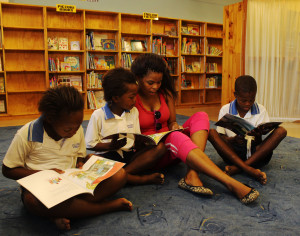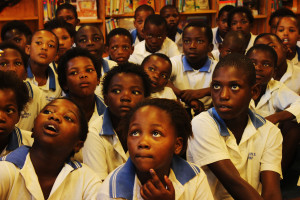On a hot, dry February day, in a heat that would normally make the most attentive student lethargic, a Grade 4 class is rapt. Seated cross-legged on the floor, their mouths agape, eyes bright and never wavering, they focus intently on the woman turning the pages of ‘Jack’s Tractor’ by Thomas Taylor. Throughout the story, they repeat sounds and words back at her: “bear”, “squawk”, “giraffe”, “squeak”, and at the end, they clap contentedly, put their shoes back on, and head to class.
The woman that so expertly held the class’s attention is Margie Cunnaman, the new librarian at Dalubuhle Primary School in Groendal, Franschoek. Margie, who has worked as a librarian all over South Africa, has found her self-described “dream job” in this beautiful Franschoek valley – and all through the Franschoek Literary Festival (FLF).
One of the main aims of the festival – which happens in May this year – is to encourage a love of reading, and not only for those who can afford the ticket price. One of the ways the organization has been working to develop literacy in the community is through the FLF Library Fund, which works at improving and resourcing community libraries, such as the Container Library (donated by the Exclusive Books Reading Trust in 2008). And in October 2012, the Library Fund went one step further and launched the FLF School Library Project at five schools in the valley.
 The project’s main mandate is to spark a love of reading, not simply as a means to a school certificate, but as a source of pleasure, excitement and entertainment. In light of this, Margie (who devised and manages the project) has carefully selected a range of 300 new books for each school that are contemporary and stimulating – and not only written in English. Dalubuhle, one of the five schools benefitting from the project – and which Nal’ibali had the honour of visiting and donating book packs this week in support of the FLF School Library Project – is a bilingual school where Grades One to Three are taught in isiXhosa with English as a second language; after Grade Three children are taught in English in all their subjects. Margie, alongside her assistant Siphokazi and the principal, recognises the importance of developing the English skills of her students, but also believes that if they are reading for pleasure, they should be able to read and enjoy stories in their mother tongue too.
The project’s main mandate is to spark a love of reading, not simply as a means to a school certificate, but as a source of pleasure, excitement and entertainment. In light of this, Margie (who devised and manages the project) has carefully selected a range of 300 new books for each school that are contemporary and stimulating – and not only written in English. Dalubuhle, one of the five schools benefitting from the project – and which Nal’ibali had the honour of visiting and donating book packs this week in support of the FLF School Library Project – is a bilingual school where Grades One to Three are taught in isiXhosa with English as a second language; after Grade Three children are taught in English in all their subjects. Margie, alongside her assistant Siphokazi and the principal, recognises the importance of developing the English skills of her students, but also believes that if they are reading for pleasure, they should be able to read and enjoy stories in their mother tongue too.
Each class visits the library for 30 minutes of storytime, when Siphokazi reads a story in isiXhosa and Margie reads a story in English. Children from Grade Three and above are allowed to take books home to share with their families, and the library is also open one afternoon a week after school. Teachers can bring their classes to the library too, to use the library resources, such as interesting magazines and educational games. The general aim – which seems very on track, less than a month into the new school year – is to get children comfortable with and enthusiastic about reading, in the most practical ways possible. As Margie says: “Kids needs books in their hands to grow a love of reading!”
For a fascinating read on nurturing multilingual spaces, read this blog by Sara Muller.

